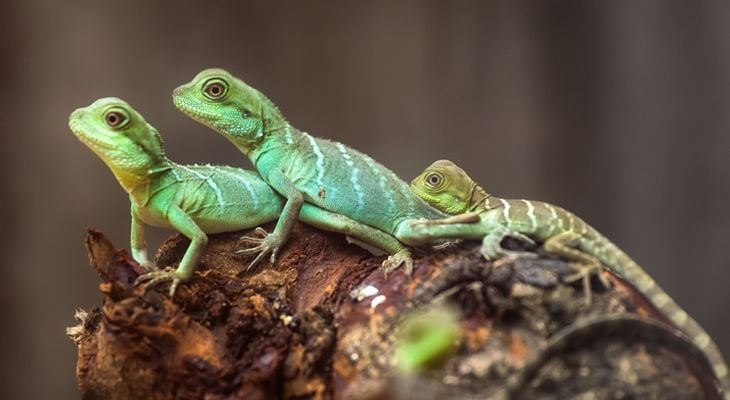Feline distemper or feline panleukopenia is a highly contagious viral disease of kittens and adult cats caused by the feline parvovirus. It is also called panleukopenia as it affects the bone marrow and causes low white blood cell counts. It is relatively common in unvaccinated cats and is often fatal,
Read more

People with limited living quarters may find that reptiles such as lizards or turtles fit perfectly into their lifestyles. Before deciding on a reptile, learn as much as possible about them and their needs. Poisonous snakes and certain reptiles should never be kept as pets. Ask your veterinarian about the suitability of a particular animal before you make your decision. There are many things to consider before committing to a reptile as a pet.
Finding out if a Pet is Legal Where You Live
Many areas have enacted laws pertaining to keeping reptiles. Some are general and some are quite specific; in many places any reptiles that are considered dangerous (venomous snakes, alligators, etc.) are illegal but some places are even more restrictive (for example, in some states all constricting snakes including ball pythons are illegal).
Salmonella Risks and Prevention
All reptile owners need to be informed about Salmonella infections. While the risks shouldn't keep most people from keeping reptiles since with the proper management the risks are minimal. Still, owners should be aware of the risks, and the US Centers for Disease Control recommends that certain risk groups should be careful about contact with reptiles and amphibians.
The Importance of Light and Heat
Many problems with keeping reptiles can be traced back to not providing the proper environmental conditions, particularly heat. Proper lighting is also important for many reptiles. The equipment to provide the proper heat and light to captive reptiles is often quite expensive, but is absolutely essential to keeping pet reptiles healthy. It is important to find out exactly what conditions your reptile needs and never cut corners when it comes to meeting those conditions!
Why Choose Captive Bred Reptiles
There are numerous reasons why you should pick a captive bred reptile if at all possible, as explained here.
How to Pick a Healthy Reptile
It is important to keep in mind that depending on where you get a reptile, it may be very stressed, dehydrated, and prone to illness. Here are some items to look for when buying your reptile to increase the chances of picking out a healthy pet reptile.
While there are many types of reptiles that could be good pets, here we cover a few you could consider.
-
Feline Distemper
Category: Pet Health, Diseases and Viruses
-
Bloat and Gastric Torsion
Category: Pet Health, Digestive and Oral Health
Bloat and gastric torsion is a serious condition and your pet should be rushed to the emergency room if this occurs. Certain breeds of dogs with deep chests and narrow waists, such as hounds, bouvier des Flandres, or doberman pinschers are more susceptible to a syndrome of gastric torsion and bloat. This
Read more -
Tapeworms
Category: Pet Health, Pests and Parasites
Tapeworms live in the digestive tracts of vertebrates as adults and often in the bodies of various animals as juveniles. In a tapeworm infection, adults absorb food predigested by the host, so the worms have no need for a digestive tract or a mouth. Large tapeworms are made almost entirely of reproductive
Read more -
Seizures
Category: Pet Health, Chronic Conditions
Seizures are common in dogs, but more unusual in cats. Seizures are just symptoms which can occur with many kinds of diseases. They can happen because of diseases outside the brain or inside the brain. Low blood sugar that can happen with an overdose of insulin or with a tumor of the pancreas can cause
Read more -
Ruptured Anterior Cruciate Ligament (ACL)
Category: Pet Health, Orthopedics
The rupture of the cruciate ligament is the most common knee injury in the dog. This injury has two common presentations. One is the young athletic dog playing roughly who acutely ruptures the ligament and is non-weight bearing on the affected hind leg. The second presentation is the older, overweight
Read more -
Luxating Patella
Category: Pet Health, Orthopedics
Luxating patella is a condition where the kneecap (patella) moves out of its normal position. Luxating patella is one of the most common knee joint abnormalities of dogs, but it is only occasionally seen in cats. It may affect one or both of the knees. In some cases it moves (luxates) towards the inside
Read more -
Canine Distemper
Category: Pet Health, Diseases and Viruses
Canine distemper is caused by a virus that is shed in bodily fluids of infected animals. The virus affects primarily the lungs, intestines, and nervous system. Symptoms of the infection can include coughing, diarrhea, vomiting, inappetance, dehydration, weight loss, seizures, and encephalitis. Secondary
Read more -
Vertigo or Old Dog Vestibular Syndrome
Category: Pet Health, Chronic Conditions
Vertigo is a syndrome in the elderly dog, which can be very frightening to the owners. The dog is suddenly afflicted with a balance problem, usually staggering, but occasionally unable to stand, and more rarely actually rolling over and over. There is a tilting of the head to one side and nystagmus,
Read more
Schedule an Appointment
Testimonials
Newsletter Signup
Sign up for more articles
Contact Us
We look forward to hearing from you
Office Hours
9:00 am - 6:30 pm
9:00 am - 6:30 pm
9:00 am - 6:30 pm
9:00 am - 6:30 pm
9:00 am - 6:30 pm
10:00 am - 6:00 pm
10:00 am - 6:00 pm
Our Location
99 Queen Street South
Tottenham, ON L0G1W0
info@pynehillsvet.com
